Marie Curie Fellows - 2024 Call
Leonardo Bevilaqua
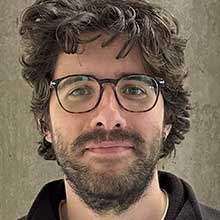
UCinEU - Undeserving of the Union: The American Idea of the 'Underclass' in Europe, 1992-2011
The aim of this project is to write a cultural history of the different ways in which the American construct of the ‘underclass’ was exported to different European national contexts in the twenty years following the Maastricht Treaty. Through a web of transatlantic relations, the concept was modified and adapted to those segments of the population that were hit the hardest by the ongoing processes of deindustrialisation, thus impacting the way in which Europeans problematized poverty and marginalisation. Academic writing, journalism and politicians’ speeches became the vectors of a gradual change that involved public policy at all levels, as well as national common sense. The project aims at verifying the hypothesis that the importation and adaptation of the concept of ‘underclass’ was functional to the differentiated implementation of neoliberal policies in different but interrelated contexts. It focuses such exploration on Germany and the United Kingdom. The magnitude of this shift in policy and mentality will be gauged through an interdisciplinary methodology integrating analytic tools from history, sociology and cultural studies. The researcher will work with Professor Fabio Perocco at the Ca’ Foscari University of Venice, who has long worked on the comparative sociology of inequality, and with Professor Loïc Wacquant at the University of California, Berkeley, whose symbolic- sociological analysis of various aspects of neoliberalism has informed much of the theoretical frame of this project, and who has done extensive work on the history of the concept of ‘underclass’ in the United States.
Sofia Cavalcanti

WAVES – Women’s Archipelagic NarratiVES. Gendered Eco-Consciousness in Water-related Anglophone Literature
Following the oceanic turn in the Humanities and attempting to reverse the patriarchal, land-centric paradigm that has long dominated ecocritical studies, WAVES aims to investigate the aquatic imaginary in contemporary archipelagic literature by anglophone women writers. Drawing from a broad corpus of primary water-texts from both Atlantic and Pacific oceanic contexts and analyzing them through a material ecocritical lens, this project has a twofold objective. First, a critical examination of wet matter as an entity possessing intrinsic agency and vitality can prompt a reevaluation of current understandings of water as an exchangeable and utilitarian resource. Second, WAVES seeks to demonstrate that modern female authors’ representations of the archipelago both elucidate the complex dynamics of oceans—from unique environmental systems to facilitators of postcolonial archipelagic diasporas—and imagine new ways to change our relationship to them. WAVES positions itself within the emerging field of the Blue Humanities and seeks to add a gender perspective to current research in archipelagic studies by pointing out the crucial part played by women in envisaging potential paths to enhance global environmental consciousness. Dr. Cavalcanti will spend the first two years at the University of North Carolina−Chapel Hill, and the third year at the Department of Linguistics and Cultural Comparative Studies of Ca’ Foscari University, under the supervision of Prof. Shaul Bassi.
Francesco Davoli
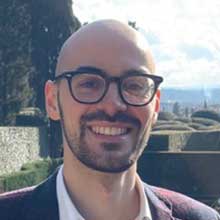
VirGIL - Virgil’s “Georgics” in Italian Literature
The project aims to investigate the legacy of Virgil’s “Georgics” in Italy between the 15th and 19th centuries and its impact on agricultural and livestock breeding practices through an analysis of translations of Virgil’s poem and agronomical treatises. Indeed, until the Modern Age, the “Georgics” was regarded not only as a poem but also as a source of practical knowledge for farmers and breeders. The project proposes an in-depth analysis of verse translations of the “Georgics” within the specified period, identifying points of contact between the corpus of translations and major agronomical treatises, to determine whether mutual influences exist. The project will be carried out at the Department of Humanities (DSU) of Ca’ Foscari University, under the supervision of Prof. A. Cotugno, with an outgoing phase at the University of Lausanne (Prof. S. Albonico) and a secondment at the University of Bologna (prof. B. Pieri).
Alexandra Deem
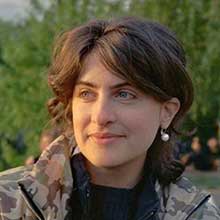
AI INFLUENCE - Automating authenticity: Probabilistic storytelling and AI influencers on social media
This project explores the convergence of generative AI, brand culture, and the logic of authenticity on social media by investigating the emerging phenomenon of AI influencers. From fictional avatars with human-like personas to AI doubles of human influencers who chat with their followers via direct messages, AI influencers automate the affective labor involved in crafting an “authentic” personal brand. Based on digital ethnographic fieldwork among those engaging with AI influencers as well those creating and deploying them using a range of large language model (LLM) capabilities, the project will foreground how the increasingly AI-powered creator economy on social media reflects the prerogatives of contemporary platform capitalism. It will analyze the social and political economic implications of the “probabilistic storytelling” generated by AI influencers, a term which highlights both the probability-based semantics of LLMs and the significance of storytelling in branding and influencer culture, with the objective of understanding how the potentials of generative AI are being realized through user imaginaries and practices rather than technical properties alone. Alexandra Deem will conduct her research in the Department of Philosophy and Cultural Heritage at Ca’ Foscari University under the supervision of Prof. Matteo Pasquinelli.
Giulio Di Basilio

VandPW – Virtue and Practical Wisdom in Aristotle’s Eudemian Ethics
To the question as to how one should live, Aristotle famously replied thus: one should live virtuously and wisely. ‘Virtue and Practical Wisdom in Aristotle’s Eudemian Ethics’ (VandPW) aims at developing the first comprehensive reconstruction of Aristotle’s doctrine of virtue in the Eudemian Ethics. Werner Jaeger, one of the most important classical scholars of the 20 th century, has called Aristotle’s Eudemian Ethics ‘the original ethics’, and it deserves this appellation for two reasons: on the one hand, it is the first ethical treatise written by Aristotle, prior to his better-known Nicomachean Ethics; on the other, it is the first philosophical treatise in the history of Western thought devoted to the question as to how one should live. However, for a long time the Eudemian Ethics has been relegated to a juvenile project later abandoned in favour of the Nicomachean Ethics. VandPW aims at remedying this state of affairs by producing a book-length examination of the topic of virtue and wisdom in Aristotle’s Eudemian Ethics. The project will be carried out in the Department of Philosophy at Ca’ Foscari, Venice under the supervision of Professor Francesca Masi.
Lilian Diniz
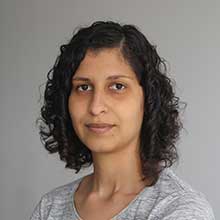
CONVERSIO - Conversion, apostasy and religious change in Early Medieval Iberia
CONVERSIO will study the complex phenomenon of religious conversion and apostasy in Early Medieval Iberia, a region that offers an interesting case study because it witnessed multiple waves of migrations and conversions across its history. CONVERSIO puts contemporary discussions of culture clashes and the role of religion in society into historical context through a thorough reappraisal of earlier episodes of momentous religious change. This project aims to analyse Christian Latin sources relating to the conversion and apostasy of other peoples to Christianity and vice-versa, focusing on the interaction between Christians, Jews and Muslims from the 5th to the 9th century in Early medieval Iberia during the Visigothic Kingdom and the first period of Islamic domination. The analysis will investigate legal and religious discourse about apostates in order to understand how and why apostates were seen and dealt with, with so harsh measures. Ultimately, it aims to understand how the significance that religious communities ascribe to the ‘crime’ of apostasy can provide precious information about the solidity and coherence of their own religious identity.
Dr. Goncalves Diniz will carry out this project at the Northern Illinois University and the Department of Humanistic Studies of the University Ca’ Foscari under the supervision of Professor Antonio Rigo.
Razvan Dumitru

TBR - Threads, Beads, and Ribbons: Clothing Trade and its Cultural Consequences in Rural East Central Europe during the Long Nineteenth Century
The project will explore cultural exchanges in Europe from the late eighteenth century to World War I to reassert the significance of European peasantry in globalisation by positioning rural communities as key players in cultural and economic exchanges. By examining textiles as complex mediums of knowledge propagation in largely illiterate societies, the project will demonstrate how items such as scarves, ribbons, and embroidered garments reflected and influenced cultural identities, enabling consistent contact with other cultures and shaping local and regional identities. The methodology underpinning this project is rooted in innovative digital humanities techniques, including data capture technologies (ResNet, VGG) and machine learning frameworks (PyTorch), to analyse visual materials from textiles, stitching patterns, and colour palettes across European and non-European regions. The findings will provide innovative insights into how textiles and other goods facilitated cultural exchanges, connecting diverse regions and enriching our understanding of rural societies' dynamic and interconnected nature.
The project will be supervised by Prof. Stefano Petrungaro at Ca' Foscari University of Venice in the Department of Linguistics and Comparative Cultural Studies, with an outgoing phase at Cornell University (USA) with Prof. Cristina Florea.
Antea Enna

AMIN_MENA – Enhancing Social Stability and Cohesion to Reduce Conflict Risks in the MENA Region
The project aims to provide a broader understanding of conflict dynamics in Jordan and Lebanon, improving the policies of governmental stakeholders and the programming of international organizations and the EU on social cohesion and stability, thereby reducing the risks of internal conflict in these countries. This study seeks to support these goals by generating new insights into social cohesion and stability trends in Lebanon and Jordan, aiming to understand the underlying conflict dynamics and prevent or address internal conflicts. By using new policy-based, anthropological, ethnographic, and participatory action research (PAR) methodologies, the project will offer a fresh perspective on conflict dynamics and trends in the MENA region, contributing to the field of peace and conflict studies. Enna will spend the first three months of the project at the Department of Government at the University of Essex, followed by one and a half years at the Centre for Strategic Studies (CSS) at the University of Jordan, and finally three months at the Issam Fares Institute at the American University of Beirut. The third year will be spent at the Department of Economics at Ca' Foscari University, under the supervision of Prof. Matteo Legrenzi.
Antea Enna's Linkedin profile.
Wasana Handapangoda
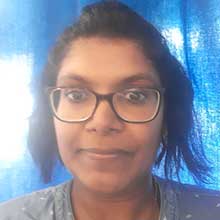
DoingDOM ‒ Embodied intersectionality in paid migrant domestic and care work: theoretical developments and policy recommendations based on the study of Sri Lankan migrant workers in Naples, Italy
DoingDOM is about paid migrant domestic and care workers (PMDCWers), both women and men, who are people of colour from working-class, minority migrant communities that remain ‘invisible’ in the country where they work and live. The results will contribute to a non-mainstream perspective on PMDCW, elucidating the dynamic, diverse and embodied lived experiences of PMDCWers from more than one standpoint. Wasana Handapangoda will carry out her research at the Department of Philosophy and Cultural Heritage under the supervision of Prof. Sabrina Marchetti.
Susann Kassem

Border Contestations - Contesting Colonial Borders: Spatial Ordering and Political Subjectivity in South Lebanese Borderlands
The project employs oral history and historical ethnography to examine how political subjectivities formed amid shifting borders, forced migrations, and changing systems of rule in South Lebanese frontier villages. By providing a political context for popular struggles against Western, Israeli, and Lebanese state interventions, this research explores the social production and maintenance of borders, their impact on migration, and how they shape understandings of the state, sovereignty, and citizenship. Moving beyond imperial perspectives, it foregrounds the lived experiences of peasant communities historically and presently affected by the imposition of colonial boundaries. This research will be carried out with an outgoing phase at the Geneva Graduate Institute under supervision of Prof. Umut Yildirim. The return phase will take place at Ca’ Foscari at the Department of Economics under supervision of Prof. Matteo Legrenzi. The research will comprise oral history interviews with former residents of the south Lebanese border zone as well as archival research in Geneva and Beirut.
Chiara Lovotti
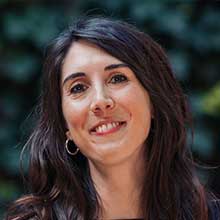
RuMEA - Russia’s interventions in conflicts of the Middle East and Africa: Local perspectives on a Russian emerging model of conflict management
The project analyses Russia’s interventions in Middle Eastern and African recent conflicts, exploring their interaction with local political contexts. Russia navigates these crises through hard power, coercive diplomacy, and economic activism, guided by the principle of non-interference in authoritarian regressions. As such, it offers local leaders a conflict management model radically different from liberal approaches dominant in the post-Cold War era. But what explains local preferences for ‘the Russian model’? This project adopts a dual perspective to examine (1) its distinctive features and (2) its appeal to recipient countries, advancing debates in both Russian and Middle Eastern/African studies. It utilises diverse methodologies to deepen specific aspects of Russia’s engagement in these regions, including elite interviews, media content analysis, and archival investigation (to document Russia’s long-dated experiences of dealing with regional crises, which may offer insights into contemporary practices). Lovotti will spend two years at Harvard University (Kennedy School) in Boston, and the third year at the Department of Economics of Ca’ Foscari University, under the supervision of Prof. Matteo Legrenzi.
Ramòn Mistral

PlONat - Nature Pluralism: Consequences of the Ontological Turn in Anthropology for Western Rationality
The project offers a philosophical approach to rethinking the Western concept of nature by engaging anthropological debates on ontology from the last two decades.The central aim is to develop a pluralist philosophical concept of nature that accommodates the diverse cosmologies documented by anthropologists worldwide. Through an analysis of the onto-anthropological literature, including in-depth studies of two well-researched animistic ontologies from the Americas (Achuar and Wixárika), the project will reveal the non-universal nature of the Western concept and challenge the fundamental assumptions of its naturalist ontology. The project proposes a novel method of philosophical inquiry: rather than assimilating indigenous perspectives into pre-existing Western frameworks, it will treat these perspectives as distinct and equally valid metaphysical viewpoints not producible by Western philosophy nor obtainable through other means. Ramón Mistral will conduct this research at The New Institute Centre for Environmental Humanities at Ca' Foscari under the supervision of Prof. Roberta Raffaetà.
Ambuj Mehrish
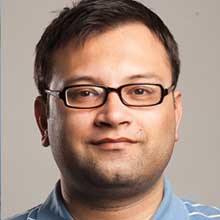
CASPER - Cross-Modal Alignment for Semantic Processing and Effective Representation
Conceptualized as a pioneering initiative, the project aims to establish an integration between the disciplines of cognitive neuroscience and advanced artificial intelligence methodologies. CASPER focuses on developing a novel framework—leveraging Graph Neural Networks (GNNs) and Large Language Models (LLMs)—to seamlessly integrate and represent diverse modalities, including text, audio, images, and neural signals (fMRI, EEG, MEG). The starting hypothesis is that aligning AI systems with neural activity patterns will not only deepen our understanding of human cognition but also enable groundbreaking advancements in multimodal learning, paving the way for complex tasks such as speech reconstruction, cross-modal content generation, and zero-shot learning. Through this transformative approach, CASPER is set to redefine the standards of semantic processing and neural signal interpretation. The project will be supervised by Prof. Sebastiano Vascon at Ca' Foscari University of Venice in the Department of Environmental Sciences, Informatics, and Statistics. Secondments will be undertaken at the Neuro-X Institute at EPFL under the supervision of Professor Dimitri Van De Ville, and at the NoCE labs at the University of Geneva under the supervision of Prof. Valentina Borghesani.
Céline Murphy
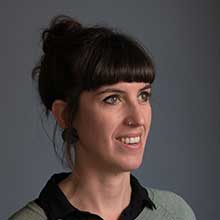
PEAK - A view from the Minoan mountains: investigating the role of marginalised communities in the establishment of a long-lasting Aegean Bronze Age ritual tradition
PEAK explores the role that rituals hosted at Bronze Age Cretan (‘Minoan’, c. 1900-1450 BCE) mountain-top sanctuaries played in the development of religious ceremonies and iconographic programmes subsequently used in and by large lowland centres (conventionally known as ‘palaces’). Seeking to develop a novel, materially-informed and more nuanced perspective on the nature of the relationship maintained between the peaks and palaces, the project places particular focus on tracing archaeologically the much-overlooked agency wielded by mountain communities in the treatment of official religious affairs, and thus by extension in the management of closely-related political, social and economic matters of island-wide significance. Through a diachronic, systematic and bottom-up analysis of ceramic figurine and vessels discovered at two neighbouring mountain-top sanctuaries and of the sites’ spatial configuration - conducted with the use of methods drawn from archaeometry, iconography studies, digital humanities and anthropology - the project will provide unprecedented insight into the establishment, continuation, transformation and broader dissemination of collective upland ritual while opening new discussions on the complex geopolitical structure of Crete during the 2nd millennium BCE. PEAK will be conducted at Ca’ Foscari University of Venice with Dr Ilaria Caloi, and upon secondment at the British School at Athens with Dr Evangelia Kiriatzi.
Amalia Rossi
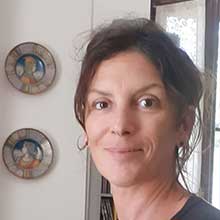
KARMIC - Knitting Artistic and Religious Materialities with Industrial Conversions
The project aims at exploring and stimulating the interconnections between artistic and religious conceptions of matter and materiality and the current “green” conversions in the industrial and infrastructural sectors, especially with regard to waste mismanagement in urban contexts. The project consists of an interdisciplinary, multi-sited and comparative research, grounded along the boundaries connecting the anthropology of religions, MCS (material culture studies), public arts, materials sciences and industrial environmental politics. This cross-disciplinary frame allows to question existing experimentations leading to pragmatic co-adaptations between local communities and the industrial/infrastructural apparatuses in territories exposed to socio-ecological/climatic challenges. Aiming at applying neo-materialist analytical tools to actual experimentations in the artistic, religious and industrial sectors, the research will focus onThai Buddhist landscapes, where creative collaborations between engaged Buddhist communities, artists and artisans, and the industrial sector in the field of waste re/up-cycling enhanced significant good practices. The Fellow will spend the outgoing phase at the Faculty of Political Sciences Chulalongkorn University (Bangkok, Thailand) and two years at University Ca’ Foscari of Venice under the supervision of Professor Francesca Tarocco.
Francesca Rotolo

musAIc - An Interdisciplinary Analysis of GenAI’s Systemic Risk to Cultural Pluralism in the Music Sector
The project aims to explore whether the legal category of systemic risk, recently introduced by the AI Act, can encompass the systematic impacts that certain generative AI systems (genAI) may have on the fundamental rights of cultural pluralism.
The use of genAI is growing rapidly, particularly in the music domain, which accounts for 8% of its global market. While their indisputable economic and societal benefits are well recognized in existing literature, concerns about their potential negative impacts on cultural pluralism are raising. However, scholars have not yet fully recognized these impacts as systemic risks under EU digital law (including the AI Act and the Digital Services Act) or as potential drivers of cultural impoverishment.
Focusing on the music sector as a paradigmatic case, musAIc aims to bridge this gap by developing a new framework to facilitate the creation of methodologies and criteria required by Article 51 and following of the AI Act, as well as the drafting of codes of practice (Article 56). To achieve this, the researcher will analyze and test in practical environments what is a creative process within an algorithm-dominated context, exploring cultural impoverishment as a possible consequence of these systems’ architecture and usage context. This will ultimately lead to the development of guidelines to help stakeholders assess these risks and assist EU policymakers in addressing them.
The project adopts a strong interdisciplinary approach, integrating law, sociology, and computer science while considering the needs of the general public, as well as professional and amateur musicians. To ensure its successful completion, Rotolo will conduct research at both EU and non-EU institutions (Switzerland, US) – which is invaluable for the global nature of the issues at its core and the project’s ultimate policy goal.
Francesca Rotolo's Linkedin profile
Vito Ruggiero
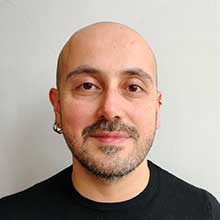
NARCOPOLITICS - Drug Trafficking and Politics: Structuring and Adaptation of Organized Crime in Bolivia's Last Authoritarian Decade (1971-1982)
The project aims to enhance our understanding of the global dynamics linking drug trafficking and political power through the case study of Bolivia between 1971 and 1982. During this period, Bolivia became a pivotal player in drug trafficking due to its extensive coca plantations, the Santa Ana cartel, and persistent ties between drug smugglers and political institutions ruled by the military, aligned with the National Security Doctrine.
Adopting a long-term historical perspective and considering organized crime as a significant Cold War non-state actor, this project has three objectives:
- examining the role of drug traffickers in Bolivia's political developments and their adaptability to changes in the national and regional context;
- identifying the political conditions under which the Santa Ana cartel intersected with political and ideological spheres and assessing the consequences;
- analyzing and comparing measures - both official and unofficial - taken by the three US administrations during this period, examining the long-term impact of the “war on drugs.”
Ruggiero will spend the first two years of the project at the Center for Latin American Studies of the University of Pittsburgh, and the third year at the Department of Linguistics and Comparative Cultural Studies of the Cà Foscari University, under the supervision of Prof. Vanni Pettinà.
Last update: 08/05/2025
